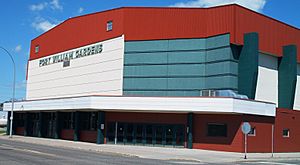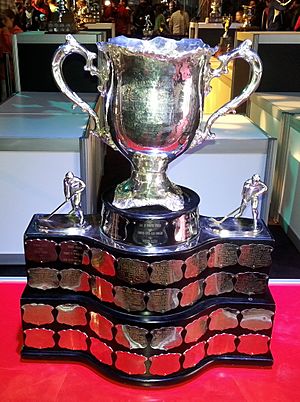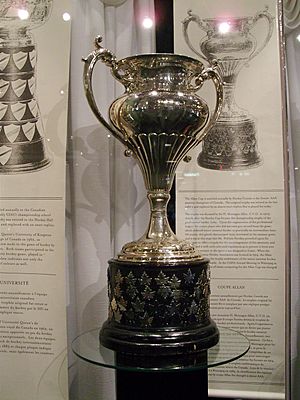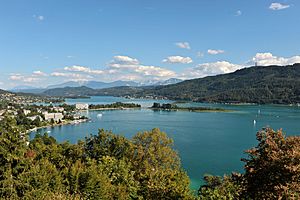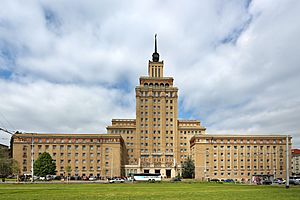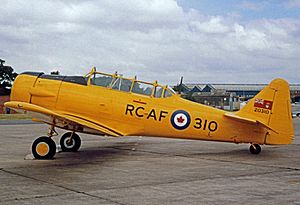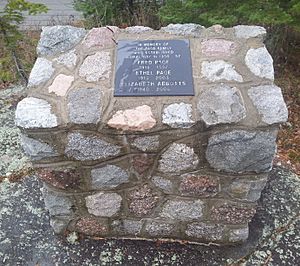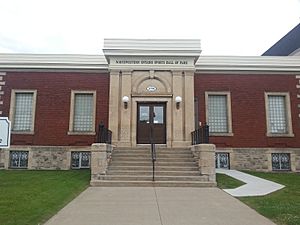Fred Page facts for kids
Quick facts for kids
Fred Page
|
|
|---|---|
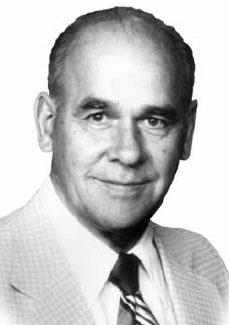 |
|
| Born | September 29, 1915 Port Arthur, Ontario, Canada
|
| Died | December 23, 1997 (aged 82) |
| Occupation | Ice hockey administrator, ice hockey referee, and businessman |
| Known for | TBAHA president CAHA president IIHF vice-president PCJHL & BCJHL executive CJAHL chairman |
| Awards | Canadian Centennial Medal, 1967 Northwestern Ontario Sports Hall of Fame, 1986 Hockey Hall of Fame, 1993 BC Hockey Hall of Fame, 1995 BC Sports Hall of Fame, 2001 |
| Honours | Fred Page Cup |
Frederick Page (September 29, 1915 – December 23, 1997) was an important Canadian ice hockey leader and referee. He grew up in Port Arthur, Ontario, where he played and refereed hockey.
Fred Page became a top executive in Canadian hockey. He led the Thunder Bay Amateur Hockey Association (TBAHA) and later became president of the Canadian Amateur Hockey Association (CAHA) from 1966 to 1968. He worked to make Canadian amateur hockey more independent from the National Hockey League (NHL). He also helped create a new system for drafting young players.
Page was also a vice-president for the International Ice Hockey Federation (IIHF). He helped organize international hockey games, including the famous 1972 Summit Series between Canada and the Soviet Union. He was later involved in junior hockey leagues in British Columbia. Fred Page was recognized for his contributions and inducted into the Hockey Hall of Fame and other sports halls of fame. The Fred Page Cup is named after him.
Contents
Early Hockey Days and Refereeing
Frederick Page was born in Port Arthur, Ontario, on September 29, 1915. He played minor ice hockey and junior ice hockey there. In the 1934–35 season, he won the TBAHA championship with the Port Arthur Juniors. He finished playing hockey in 1939.
From 1940 to 1948, Page worked as an ice hockey referee and coach in Fort William, Ontario. He became a referee for the TBAHA from 1948 to 1954. He even refereed the very first game at the Fort William Gardens when it opened in 1951.
Fred Page was known for his refereeing skills. He was chosen to officiate important playoff games for the Memorial Cup and the Allan Cup. During one game in 1953, a player scored a winning goal and started dancing with Page on the ice! Page later joked that he didn't like dancing. He also refereed in the 1958 Memorial Cup and Allan Cup tournaments.
Leading Hockey in Thunder Bay
Page became a leader in Fort William's minor hockey in 1948. He was elected president of the Fort William Minor Hockey Association in 1951. He then joined the TBAHA executive committee in 1954 and was its president from 1959 to 1964.
He helped arrange exhibition games in Fort William with teams from the Soviet Union and Japan. He also pushed for a new arena in Port Arthur. In 1960, he announced that Fort William would host the 1961 Canadian Amateur Hockey Association (CAHA) meeting.
As TBAHA president, Page also worked with the CAHA. He oversaw the Western half of the 1960 Memorial Cup playoffs. In one game, he stopped the final match due to too much fighting and awarded the series to the Brandon Wheat Kings. He also suggested better payment for travel costs for visiting teams in senior hockey playoffs. Page preferred having one referee and two linesmen in games. In 1961–62, he traveled with the Port Arthur Bearcats on their European tour, where they won the 1962 Ahearne Cup.
Becoming a CAHA Vice-President
Fred Page was elected second vice-president of the CAHA in May 1962. He worked to improve the quality of junior hockey in Western Canada. He also helped create a new draft agreement with the National Hockey League (NHL). This agreement allowed 17-year-olds to be drafted, with money paid to their junior clubs. He even chaperoned the Soviet Union national ice hockey team during their tour in Canada in 1962.
From 1963 to 1964, he led a CAHA committee to create leadership programs and clinics for coaches. In May 1964, he became the first vice-president of the CAHA. He worked on committees for the Canada men's national junior ice hockey team and looked into how much the CAHA depended on the NHL for money.
Page also helped solve disagreements between different junior leagues. He was in charge of the Western junior playoffs for the 1964 Memorial Cup. He also managed the 1965 Memorial Cup, which had many penalties.
In May 1965, Page was re-elected as first vice-president. He announced that the CAHA would choose where the 1966 Memorial Cup would be played. He also attended meetings with potential team owners in Western Canada. They discussed ending direct team sponsorship by the NHL. Page expected to talk with the NHL about a new agreement, as the old one would end in June 1967.
Leading the CAHA as President
First Year as President
Fred Page became president of the CAHA on May 28, 1966, and served for two years. As president, he led the Canadian national team committee and the CAHA rules committee. He wanted the CAHA to be more in charge of its own hockey and less dependent on the NHL. He aimed to replace the system where NHL clubs directly sponsored junior teams with a universal draft. This new system would give the CAHA more control over its young players.
Page and NHL president Clarence Campbell announced a new five-year agreement in August 1966. This agreement, starting July 1, 1967, ended direct sponsorship of junior teams by the NHL. It also stopped the old "A, B, and C forms" that had caused problems for amateur players' families. Young players could now be drafted by the NHL after junior hockey or sign as free agents at age 20. The NHL agreed to pay development fees to the CAHA for drafted players, which the CAHA could then share with the teams that helped develop them.
Despite this new agreement, Page faced challenges from teams in Western Canada. These teams wanted the age limit to be 21 and for players to move more freely between provinces. Some teams left the SJHL and formed the independent Canadian Major Junior Hockey League (CMJHL), which was not approved by the CAHA. Page suspended those involved with the CMJHL. The CAHA later allowed players and teams to return if they rejoined CAHA-approved leagues to be eligible for the Memorial Cup.
On the international side, Page worked on rules for players to become amateurs again after playing professionally. He also dealt with threats from the International Olympic Committee (IOC) to remove hockey from the Winter Olympic Games. Page didn't take the threat seriously, believing hockey helped fund the Olympics. Canada also considered leaving the International Ice Hockey Federation (IIHF) if they weren't allowed to host the 1969 or 1970 World Championships.
Second Year as President
In 1967, Page was re-elected as CAHA president. The new five-year agreement with the NHL was approved. NHL teams would pay $3,000 for each of the first 72 players drafted and $2,000 for others. Page and the CAHA would manage these fees. A joint committee was also set up to help develop players, with Page as co-chairman.
Later in 1967, the IIHF chose Canada to host the 1970 World Ice Hockey Championships. They also allowed minor league professionals and reinstated amateurs to play. Page responded to Russian protests by saying the decision was made by a majority vote. He felt that Canada's national team was often limited by not being able to use professionals in the Olympics.
The CAHA invited Canadian cities with large arenas to bid for hosting games in the 1970 World Championships. Montreal and Winnipeg were chosen as hosts. The CAHA also approved a plan for a transatlantic hockey league with national teams from Canada, the Soviet Union, Czechoslovakia, Sweden, and the United States. Page felt its success depended on Soviet participation, but the league never happened.
In other CAHA news, Page announced that the Spokane Jets would host the 1968 Allan Cup quarterfinals. This was the first time Allan Cup games were played outside of Canada.
After His CAHA Presidency
In May 1968, Fred Page became the past president of the CAHA. He stayed on the joint CAHA-NHL player development committee. He also helped unite amateur hockey in Quebec. He approved of a Japanese junior player, Hiroshi Hori, playing for the Winnipeg Monarchs in 1968–69.
Page continued to attend CAHA meetings as a life member. His term as past president ended in May 1971.
International Hockey Leadership
Page was elected second vice-president of the IIHF in 1966 in Austria. He was later elected first vice-president in 1969 in Switzerland. As IIHF vice-president, he oversaw North American membership. He helped set up leadership clinics and kept the CAHA informed about international matters. He also helped organize the Ice Hockey World Championships and was a director at the 1968 Winter Olympics and the 1972 Winter Olympics.
For the 1970 World Ice Hockey Championships in Canada, Page dealt with disagreements over the schedule. In December 1969, Avery Brundage of the IOC said that any country playing against Canadian professionals would not be allowed in the 1972 Winter Olympics. Page tried to find a compromise, suggesting an exhibition tournament instead of an official World Championship. However, the IIHF decided against allowing professionals. On January 20, 1970, Canada withdrew from international play and gave up hosting the 1970 World Championships.
In May 1971, Canada began talks to return to international hockey. In February 1972, Page mentioned the possibility of Canada and the Soviet Union playing each other with professionals. He had been negotiating with Anatoly Tarasov since 1971.
Canada and the Soviet Union agreed to play eight games against each other using their best players, including professionals. This became known as the 1972 Summit Series. Fred Page was one of the four people who signed the agreement on April 18, 1972, in Prague. He signed as vice-president of the IIHF. This agreement brought Canada back to international hockey.
British Columbia Hockey Leadership
Page helped create the Pacific Junior A Hockey League (PCJHL) in 1971 and became its executive director. He then served as its president from 1975 to 1979. This league competed with the British Columbia Junior Hockey League (BCJHL).
The two leagues merged in 1979 under the BCJHL name. Page was the executive director of the BCJHL from 1979 to 1982, its president from 1982 to 1983, and chairman of the board from 1980 until 1996. He spoke out against the Western Hockey League drafting players under 15. He also fought for BCJHL teams to receive money when their players were drafted by NHL teams. Page supported making neck protection mandatory for junior players after a player's death in 1985.
In November 1993, Page was a delegate at the first meeting of the Canadian Junior A Hockey League. He was nominated as that league's first chairman of the board. Fred Page retired from his many hockey roles in 1996, after 23 years as a hockey executive in British Columbia.
Professional Life and Family
Fred Page worked as a land surveyor from 1935 to 1939. He then worked for the Canadian Car and Foundry (Can Car) from 1940 to 1947. He helped get parts to build airplanes for the Royal Canadian Air Force and the Royal Navy. He also helped get materials for building buses. In 1945, he started his own business supplying flooring materials for vehicles.
In 1951, he joined the Port Arthur Shipbuilding Company (PASC). He helped set up its aircraft division and supplied parts. He later became a full-time supervisor there until 1965. He oversaw making parts for trainer aircraft and other planes. He also supervised the design of fiberglass parts for paper mills.
Page moved to Richmond, British Columbia, in 1966. He worked for Industrial Coatings Limited as a sales manager. He was elected to its board of directors in 1969 and stayed there until he retired.
Fred Page and his brother were raised by their father. Page married Ethel Hylda Willianen in 1937. They lived in Fort William, Ontario, and later in Port Arthur. Ethel became a hairdresser. The couple had two daughters. Page also built cottages at Coral Bay on Thunder Bay.
In 1965, Page moved to North Vancouver, British Columbia. He coached a Pee-Wee hockey team at the North Shore Winter Club. He and Ethel often traveled to international hockey events and visited Thunder Bay, Ontario.
Fred Page passed away on December 23, 1997, in North Vancouver. He had been married to Ethel for 60 years. His ashes were scattered near his family cottage.
Awards and Recognition
Fred Page received many awards for his service to hockey. He was given citations from the Fort William Minor Hockey Association, the IIHF, the CAHA, and the AHAUS. He also received the Canadian Centennial Medal in 1967. The Japanese Olympic Committee honored him in 1972 for his help with ice hockey at the 1972 Winter Olympics. He became a life member of the CAHA in 1973.
In 1986, he was inducted into the Northwestern Ontario Sports Hall of Fame. For his lifelong dedication to hockey, Fred Page was inducted into the Hockey Hall of Fame in 1993 as a "builder." In British Columbia, he was inducted into the BC Hockey Hall of Fame in 1995 and, after his death, into the BC Sports Hall of Fame in 2001.
Two different hockey trophies are named after him: the Fred Page Cup in British Columbia, awarded by the British Columbia Hockey League, and another Fred Page Cup for the Eastern Canada Junior A champion, which started in 1995. The North Shore Winter Club also has a Midget AAA hockey tournament named after him since 1984.
 | May Edward Chinn |
 | Rebecca Cole |
 | Alexa Canady |
 | Dorothy Lavinia Brown |


